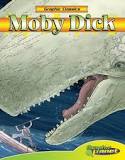Moby-Dick Page #18
Moby-Dick; or, The Whale is an 1851 novel by American writer Herman Melville. The book is sailor Ishmael's narrative of the obsessive quest of Ahab, captain of the whaling ship Pequod, for revenge on Moby Dick, the white whale that on the ship's previous voyage bit off Ahab's leg at the knee.
Shifting the barrow from my hand to his, he told me a funny story about the first wheelbarrow he had ever seen. It was in Sag Harbor. The owners of his ship, it seems, had lent him one, in which to carry his heavy chest to his boarding house. Not to seem ignorant about the thing—though in truth he was entirely so, concerning the precise way in which to manage the barrow—Queequeg puts his chest upon it; lashes it fast; and then shoulders the barrow and marches up the wharf. “Why,” said I, “Queequeg, you might have known better than that, one would think. Didn't the people laugh?” Upon this, he told me another story. The people of his island of Rokovoko, it seems, at their wedding feasts express the fragrant water of young cocoanuts into a large stained calabash like a punchbowl; and this punchbowl always forms the great central ornament on the braided mat where the feast is held. Now a certain grand merchant ship once touched at Rokovoko, and its commander—from all accounts, a very stately punctilious gentleman, at least for a sea captain—this commander was invited to the wedding feast of Queequeg's sister, a pretty young princess just turned of ten. Well; when all the wedding guests were assembled at the bride's bamboo cottage, this Captain marches in, and being assigned the post of honor, placed himself over against the punchbowl, and between the High Priest and his majesty the King, Queequeg's father. Grace being said,—for those people have their grace as well as we—though Queequeg told me that unlike us, who at such times look downwards to our platters, they, on the contrary, copying the ducks, glance upwards to the great Giver of all feasts—Grace, I say, being said, the High Priest opens the banquet by the immemorial ceremony of the island; that is, dipping his consecrated and consecrating fingers into the bowl before the blessed beverage circulates. Seeing himself placed next the Priest, and noting the ceremony, and thinking himself—being Captain of a ship—as having plain precedence over a mere island King, especially in the King's own house—the Captain coolly proceeds to wash his hands in the punchbowl;—taking it I suppose for a huge finger-glass. “Now,” said Queequeg, “what you tink now?—Didn't our people laugh?” At last, passage paid, and luggage safe, we stood on board the schooner. Hoisting sail, it glided down the Acushnet river. On one side, New Bedford rose in terraces of streets, their ice-covered trees all glittering in the clear, cold air. Huge hills and mountains of casks on casks were piled upon her wharves, and side by side the world-wandering whale ships lay silent and safely moored at last; while from others came a sound of carpenters and coopers, with blended noises of fires and forges to melt the pitch, all betokening that new cruises were on the start; that one most perilous and long voyage ended, only begins a second; and a second ended, only begins a third, and so on, for ever and for aye. Such is the endlessness, yea, the intolerableness of all earthly effort. Gaining the more open water, the bracing breeze waxed fresh; the little Moss tossed the quick foam from her bows, as a young colt his snortings. How I snuffed that Tartar air!—how I spurned that turnpike earth!—that common highway all over dented with the marks of slavish heels and hoofs; and turned me to admire the magnanimity of the sea which will permit no records. At the same foam-fountain, Queequeg seemed to drink and reel with me. His dusky nostrils swelled apart; he showed his filed and pointed teeth. On, on we flew; and our offing gained, the Moss did homage to the blast; ducked and dived her bows as a slave before the Sultan. Sideways leaning, we sideways darted; every ropeyarn tingling like a wire; the two tall masts buckling like Indian canes in land tornadoes. So full of this reeling scene were we, as we stood by the plunging bowsprit, that for some time we did not notice the jeering glances of the passengers, a lubber-like assembly, who marvelled that two fellow beings should be so companionable; as though a white man were anything more dignified than a whitewashed negro. But there were some boobies and bumpkins there, who, by their intense greenness, must have come from the heart and centre of all verdure. Queequeg caught one of these young saplings mimicking him behind his back. I thought the bumpkin's hour of doom was come. Dropping his harpoon, the brawny savage caught him in his arms, and by an almost miraculous dexterity and strength, sent him high up bodily into the air; then slightly tapping his stern in mid-somerset, the fellow landed with bursting lungs upon his feet, while Queequeg, turning his back upon him, lighted his tomahawk pipe and passed it to me for a puff. “Capting! Capting!” yelled the bumpkin, running towards that officer; “Capting, Capting, here's the devil.” “Hallo, you sir,” cried the Captain, a gaunt rib of the sea, stalking up to Queequeg, “what in thunder do you mean by that? Don't you know you might have killed that chap?” “What him say?” said Queequeg, as he mildly turned to me. “He say,” said I, “that you came near kill-e that man there,” pointing to the still shivering greenhorn. “Kill-e,” cried Queequeg, twisting his tattooed face into an unearthly expression of disdain, “ah! him bevy small-e fish-e; Queequeg no kill-e so small-e fish-e; Queequeg kill-e big whale!” “Look you,” roared the Captain, “I'll kill-e you, you cannibal, if you try any more of your tricks aboard here; so mind your eye.” But it so happened just then, that it was high time for the Captain to mind his own eye. The prodigious strain upon the main-sail had parted the weather-sheet, and the tremendous boom was now flying from side to side, completely sweeping the entire after part of the deck. The poor fellow whom Queequeg had handled so roughly, was swept overboard; all hands were in a panic; and to attempt snatching at the boom to stay it, seemed madness. It flew from right to left, and back again, almost in one ticking of a watch, and every instant seemed on the point of snapping into splinters. Nothing was done, and nothing seemed capable of being done; those on deck rushed towards the bows, and stood eyeing the boom as if it were the lower jaw of an exasperated whale. In the midst of this consternation, Queequeg dropped deftly to his knees, and crawling under the path of the boom, whipped hold of a rope, secured one end to the bulwarks, and then flinging the other like a lasso, caught it round the boom as it swept over his head, and at the next jerk, the spar was that way trapped, and all was safe. The schooner was run into the wind, and while the hands were clearing away the stern boat, Queequeg, stripped to the waist, darted from the side with a long living arc of a leap. For three minutes or more he was seen swimming like a dog, throwing his long arms straight out before him, and by turns revealing his brawny shoulders through the freezing foam. I looked at the grand and glorious fellow, but saw no one to be saved. The greenhorn had gone down. Shooting himself perpendicularly from the water, Queequeg, now took an instant's glance around him, and seeming to see just how matters were, dived down and disappeared. A few minutes more, and he rose again, one arm still striking out, and with the other dragging a lifeless form. The boat soon picked them up. The poor bumpkin was restored. All hands voted Queequeg a noble trump; the captain begged his pardon. From that hour I clove to Queequeg like a barnacle; yea, till poor Queequeg took his last long dive.
Translation
Translate and read this book in other languages:
Select another language:
- - Select -
- 简体中文 (Chinese - Simplified)
- 繁體中文 (Chinese - Traditional)
- Español (Spanish)
- Esperanto (Esperanto)
- 日本語 (Japanese)
- Português (Portuguese)
- Deutsch (German)
- العربية (Arabic)
- Français (French)
- Русский (Russian)
- ಕನ್ನಡ (Kannada)
- 한국어 (Korean)
- עברית (Hebrew)
- Gaeilge (Irish)
- Українська (Ukrainian)
- اردو (Urdu)
- Magyar (Hungarian)
- मानक हिन्दी (Hindi)
- Indonesia (Indonesian)
- Italiano (Italian)
- தமிழ் (Tamil)
- Türkçe (Turkish)
- తెలుగు (Telugu)
- ภาษาไทย (Thai)
- Tiếng Việt (Vietnamese)
- Čeština (Czech)
- Polski (Polish)
- Bahasa Indonesia (Indonesian)
- Românește (Romanian)
- Nederlands (Dutch)
- Ελληνικά (Greek)
- Latinum (Latin)
- Svenska (Swedish)
- Dansk (Danish)
- Suomi (Finnish)
- فارسی (Persian)
- ייִדיש (Yiddish)
- հայերեն (Armenian)
- Norsk (Norwegian)
- English (English)
Citation
Use the citation below to add this book to your bibliography:
Style:MLAChicagoAPA
"Moby-Dick Books." Literature.com. STANDS4 LLC, 2024. Web. 26 Dec. 2024. <https://www.literature.com/book/moby-dick_18>.




Discuss this Moby-Dick book with the community:
Report Comment
We're doing our best to make sure our content is useful, accurate and safe.
If by any chance you spot an inappropriate comment while navigating through our website please use this form to let us know, and we'll take care of it shortly.
Attachment
You need to be logged in to favorite.
Log In